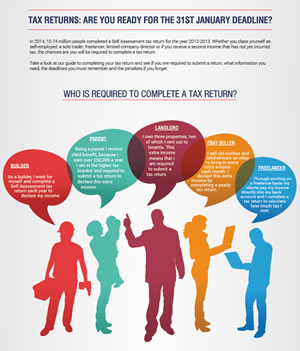
QandA on tax returns for 167,000 self-employed building workers
Access the full Builder’s tax return complete infographic via the link above
Heather Dore who works as a Regional Manager at Easy Accountancy answers some commonly asked questions from her self-employed clients.
I am paid a mixture of cash, bank transfers and cheques. How would you recommend I record my cash income in case I am investigated by HM Revenue and Customs (HMRC)?
Whatever form your income takes you must record your income. I recommend keeping a spreadsheet to record all income and expenditure and updating it at least once a week. You should also keep copies of any sales receipts or invoices for seven years as they can be used as proof of income.
As a construction worker I am required to wear protective clothing whenever I am on site. Are these items eligible to be claimed as business expenses?
A business expense is a cost that is solely and exclusively for business purposes. Some clothing items such as branded uniform or in this case protective clothing can be classed as an expense, which means that you will not pay tax on these costs.
When completing building work I invoice my clients a total amount, which includes the cost of labour and materials. When I fill in my tax return is my income the total amount or just the amount for labour?
When completing your tax return your income should be the total amount that you have been paid by your clients over the year including labour and material costs. The cost of building materials should then be noted on your return as an expense, which will then be deducted from your total turnover for the year.
How do I claim a cost as a business expense?
The process of claiming a business expense is very straightforward. Simply note your total business expenses for the year on your tax return. Your total expenses for the year will then be deducted from your total turnover to give your total taxable income. You will therefore not incur tax on your business expenses.
When is the tax return deadline?
The deadline for the impending 2013/14 tax year is 31st January 2015.
What happens if I do not submit my tax return by the deadline?
The deadline for paper tax returns is October 31st. If you were planning to submit a paper return and you missed this deadline then you must submit your return via the online form on the HMRC website. The deadline for online returns is January 31st and if this deadline is not met you will incur a penalty of andpound;100.
If you have not submitted your return three months following the initial deadline you will incur further penalties of andpound;10 for each day that your return continues to be late up to a possible total of andpound;900 or 90 days.
If your return is six months late you will incur a further penalty of andpound;300 or five per cent of your tax bill, whichever amount is greater.
If your return has still not been received by HMRC 12 months after the initial deadline your will incur another fine of either andpound;300 or five per cent of the total tax due. If your return continues to be late then you could be liable for further penalties depending on your situation.
What happens if I cannot pay my tax bill by the deadline?
If you are unable to pay your tax bill you should contact HMRC and explain the reasons why as you could be able to agree on a deadline extension or to pay your bill in instalments.
If you fail to pay your tax bill on time without warning HMRC first you will be liable to penalties.
HMRC will usually charge interest on unpaid bills. If your bill has not been received by February 28th, a month after the deadline, you could incur five per cent interest. If your tax bill has not been received by July 31st then you could receive a further five per cent penalty.
For those who have still not paid their tax bill a year after the deadline you could incur a penalty, which is equal to the amount of unpaid tax.
Am I able to amend my return once it has been submitted?
You are able to edit your return if it has already been submitted. The deadline for amends is 12 months following the tax return deadline.
To amend a return that has been submitted online you will need to log into your online account on the HMRC website.
To edit a paper return that has already been submitted you should send the updated pages to HMRC with a note to say that you would like to make some amends.
How do I know if HMRC are planning to investigate my return?
If HMRC decide to look into your tax return you will be contacted in writing within 12 months of HMRC receiving your return.
In the case that you have edited your return or submitted your return late, HMRC are entitled to a window of 12 months and up until the next ñquarter dayî. Quarter days are January 31st, April 30th, July 31st and October 31st.
How long should I keep expense receipts and proof of income for?
It is recommend that you keep copies of your records, in particular sales receipts, invoices and expense receipts for seven years in case HMRC ever ask to view them.
SEND YOUR COMMENTS TO BUILDINGTALK
READ MORE HOT TOPICS
Latest news

9th April 2025
FIT Show Launches Comprehensive CPD Learning Programme - Registration Now Open!
FIT Show, the UK’s leading trade event for the window, door, flat glass, hardware, components, and roofing industries, has unveiled its extensive learning programme for the 2025 event.
Posted in Architectural Ironmongery, Articles, Building Industry Events, Building Industry News, Building Products & Structures, Building Services, Building Systems, Continuing Professional Development (CPD's), Doors, Exhibitions and Conferences, Glass, Glazing, Innovations & New Products, Posts, Restoration & Refurbishment, Roofs, Seminars, Timber Buildings and Timber Products, Training, Windows
8th April 2025
First look at industry speakers for GEO Business 2025
GEO Business, the UK’s premier geospatial event, is set to return to ExCeL London on 4 – 5 June 2025, bringing together the brightest minds in the industry.
Posted in Articles, Building Industry Events, Building Industry News, Building Products & Structures, Building Services, Exhibitions and Conferences, Information Technology, Innovations & New Products, Restoration & Refurbishment, Retrofit & Renovation, Seminars
8th April 2025
Digital Construction Week 2025 announces first wave of industry-leading speakers
Digital Construction Week (DCW), the UK’s premier event for digital innovation in the built environment, is set to return to ExCeL London on 4 – 5 June 2025.
Posted in Articles, BIM, Infrastructure & CAD Software, Building Industry Events, Building Industry News, Building Products & Structures, Building Services, Building Systems, Civil Engineering, Exhibitions and Conferences, Hard Landscaping & Walkways, Health & Safety, Information Technology, Innovations & New Products, Landscaping, Retrofit & Renovation, Seminars
7th April 2025
Abloy UK provides bespoke access control solution for CPA Group’s Lanarkshire HQ
Abloy UK has supplied CPA Group with its PROTEC2 CLIQ solution to streamline access control and protect assets at its headquarters in Shotts, Lanarkshire.
Posted in Access Control & Door Entry Systems, Architectural Ironmongery, Articles, Building Industry News, Building Products & Structures, Building Services, Case Studies, Doors, Facility Management & Building Services, Health & Safety, Restoration & Refurbishment, Retrofit & Renovation, Security and Fire Protection
 Sign up:
Sign up: